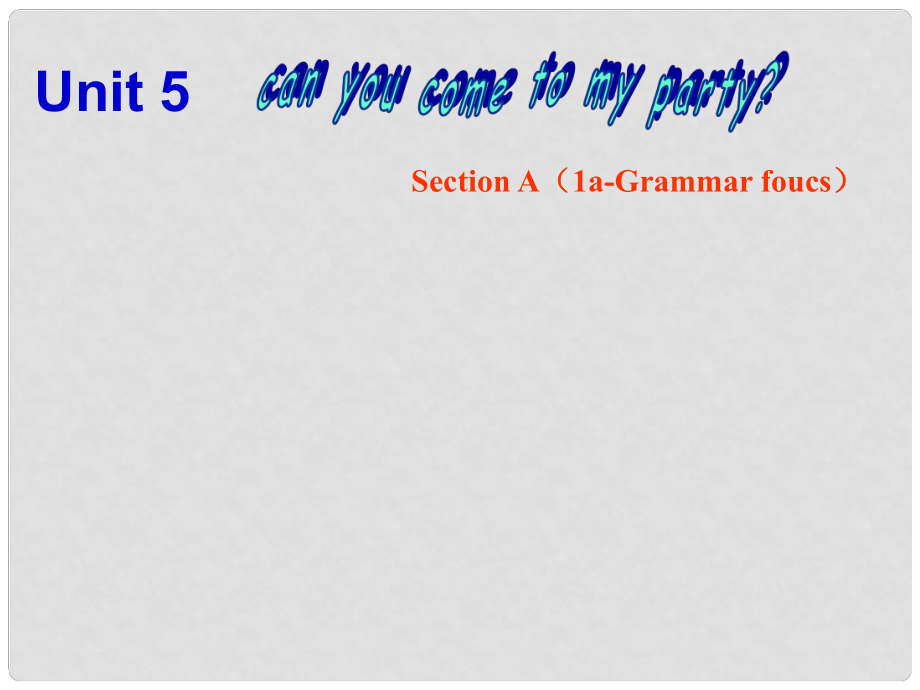《山東省臨沂鳳凰嶺中學(xué)八年級英語《Unit5Can you come to my party》課件(3) 人教新目標(biāo)版》由會(huì)員分享���,可在線閱讀���,更多相關(guān)《山東省臨沂鳳凰嶺中學(xué)八年級英語《Unit5Can you come to my party》課件(3) 人教新目標(biāo)版(20頁珍藏版)》請?jiān)谘b配圖網(wǎng)上搜索�����。
1�����、Unit 5 Section A(1a-Grammar foucs)Can you swim?Can you ride a bike?Can you play the piano?Ask and answerAsk and answerA: Can you come to my party ? : Sure, Id love to. : Im sorry, I cant. I have to (do my homework)come to my party A: Can you come to my party ? B: . A: Can you come to my party ? B: .
2、go to the moviego hikingA: Can you go hiking with me?B: .A: Can you ?B: .go fishingA: Can you (with me)?B: .have a piano lessonplay soccerstudy for a test.go to the beachA: Can you (with me)?B: .help my parentsgo to concertA: Can you (with me)?B: .go to the doctorgo to the moviesA: Can you (with me)
3���、?B: .babysit my sistergo to the zooA: Can you (with me)?B: .TimTedWilsonKayAnna1b Listen and write the name (Tim Kay Anna and Wilson)A: Can you ,B?B: Im sorry, I cant. I have to .A : How about you, C? Can you?C: Id love to.A : D? Can you.?D: I cant. I have to.2a ListeningCircle “can” or “cant”1. Jef
4��、f can / cant come to the party.2. Marry can / cant come to the party.3. May can / cant come to the party.4. Claudia can / cant come to the party.5. Paul can / cant come to the party.cantcancantcantcanHey, Gina, can you go to the movies on Saturday?Im sorry, I cant. I have too much homework this week
5�、end.Sure, Joe. Thanks for asking.Thats too bad. Maybe another time.JoeGinaAsk your friends to do sth1. can 的用法的用法 ()表邀請�����。()表邀請�。 若接受邀請�����,回答為:若接受邀請,回答為: OK./All right./Sure./ Of course./Certainly./Yes(Sure),Id love(like) to. 若不接受邀請���,回答為:若不接受邀請�,回答為:Sorry,cant.(+原因原因) eg . Can you come to the party? Yes/Sur
6、e,Id love/like to. Sorry,Icant. I have to help my parents.()表能力()表能力“能����,會(huì)能,會(huì)”否定句否定句 cant不能不能 eg. He can swim,but I cant. How long can you stay under water?()在否定句�����,疑問句中表示()在否定句��,疑問句中表示“不可能不可能”或或“一定不一定不” eg. Can he come ?No,he cant come.(他會(huì)來嗎��?不���,他不能來)(他會(huì)來嗎��?不���,他不能來)2.情態(tài)動(dòng)詞情態(tài)動(dòng)詞“have to”的用法的用法have to有人稱和數(shù)的變化��,它的第三人稱單數(shù)為有人稱和數(shù)的變化�����,它的第三人稱單數(shù)為“has to” ,過去時(shí)為過去時(shí)為had to, eg. He should study hard . = He has to study hard .summaryHOMEWORK Copy the grmmar box in your ExB Read the new wordsThank you!
 山東省臨沂鳳凰嶺中學(xué)八年級英語《Unit5Can you come to my party》課件(3) 人教新目標(biāo)版
山東省臨沂鳳凰嶺中學(xué)八年級英語《Unit5Can you come to my party》課件(3) 人教新目標(biāo)版

